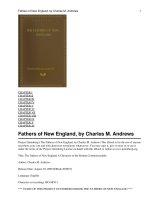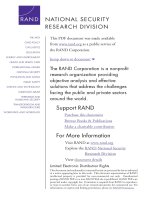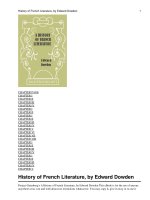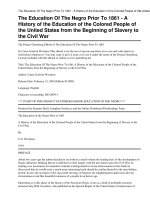The new world a history of the english speaking peoples, volume ii
Bạn đang xem bản rút gọn của tài liệu. Xem và tải ngay bản đầy đủ của tài liệu tại đây (2.56 MB, 368 trang )
Tai Lieu Chat Luong
TableofContents
TitlePage
CopyrightPage
Acknowledgements
Introduction
PREFACE
BOOKI-RENAISSANCEANDREFORMATION
CHAPTERONE-THEROUNDWORLD
CHAPTERTWO-THETUDORDYNASTY
CHAPTERTHREE-KINGHENRYVIII
CHAPTERFOUR-CARDINALWOLSEY
CHAPTERFIVE-THEBREAKWITHROME
CHAPTERSIX-THEENDOFTHEMONASTERIES
CHAPTERSEVEN-THEPROTESTANTSTRUGGLE
CHAPTEREIGHT-GOODQUEENBESS
CHAPTERNINE-THESPANISHARMADA
CHAPTERTEN-GLORIANA
BOOKII-THECIVILWAR
CHAPTERELEVEN-THEUNITEDCROWNS
CHAPTERTWELVE-THEMAYFLOWER
CHAPTERTHIRTEEN-CHARLESIANDBUCKINGHAM
CHAPTERFOURTEEN-THEPERSONALRULE
CHAPTERFIFTEEN-THEREVOLTOFPARLIAMENT
CHAPTERSIXTEEN-THEGREATREBELLION
CHAPTERSEVENTEEN-MARSTONMOORANDNASEBY
CHAPTEREIGHTEEN-THEAXEFALLS
BOOKIII-THERESTORATION
CHAPTERNINETEEN-THEENGLISHREPUBLIC
CHAPTERTWENTY-THELORDPROTECTOR
CHAPTERTWENTY-ONE-THERESTORATION
CHAPTERTWENTY-TWO-THEMERRYMONARCH
CHAPTERTWENTY-THREE-THEPOPISHPLOT
CHAPTERTWENTY-FOUR-WHIGANDTORY
CHAPTERTWENTY-FIVE-THECATHOLICKING
CHAPTERTWENTY-SIX-THEREVOLUTIONOF1688
ENDNOTES
INDEX
SUGGESTEDREADING
Copyright©1956byTheRightHonourableSirWinstonChurchill,
K.G.O.M.C.H.M.P.
ThiseditionpublishedbyBarnes&Noble,Inc.,byarrangementwith
Dodd,Mead&Company,Inc.
IntroductionandSuggestedReading©2005
byBarnes&Noble,Inc.
This2005editionpublishedbyBarnes&Noble,Inc.
Allrightsreserved.Nopartofthispublicationmaybereproduced,stored
inaretrievalsystem,ortransmitted,inanyformorbyany
means,electronic,mechanical,photocopying,recording,or
otherwise,withoutpriorwrittenpermissionfromthepublisher.
MapsbyJamesMacdonald
ISBN-13:978-0-7607-6858-7ISBN-10:0-7607-6858-7
eISBN:978-1-41142860-7
PrintedandboundintheUnitedStatesofAmerica
3579108642
ACKNOWLEDGMENTS
IMUSTAGAINRECORDMYTHANKSTOMRF.W.DEAKINANDMRG.
M.YoungandtoDrKeithFeilingfortheirassistancebeforetheSecondWorld
War in the preparation of this work; to Mr Alan Hodge, Mr J. Hurstfield of
University College, London, Mr D. H. Pennington of Manchester University,
andDrA.L.RowseofAllSouls,whohavescrutinisedthetextinthelightof
subsequentadvancesinhistoricalknowledge;andtoMrDenisKellyandMrC.
C. Wood. I have also to thank many others who have read these pages and
commentedonthem.
IncomposingthisvolumeIhavedrawngratefullyonthewritingsofGardiner,
PollardandRanke,ontheOxfordHistoryofEnglandandontheworksofother
scholarspastandpresent.InthelasttwochaptersIhave,withthepermissionof
Charles Scribner’s Sons, Inc., followed in part the general character of my
Marlborough:HisLifeandTimes.
INTRODUCTION
IN THE SIXTEENTH AND SEVENTEENTH CENTURIES ENGLAND
underwent a startling series of transformations. The turbulent reigns of the
TudorsandStuartswitnessedtheProtestantReformation,thegrowthofpowerful
monarchies, the English Civil War, and the colonization of the New World. In
this, the second volume of his A History of the English-Speaking Peoples, Sir
Winston Churchill turned his considerable rhetorical and analytical acumen to
weavingacompellingandinsightfulnarrativeoftheseformativecenturies.
It is amazing to consider that Winston Churchill, despite a busy political
career,hadthetimeandcapabilitytowriteforty-fivebooks.Anumberofforces
brought him to such prolific heights. Churchill had a genuine curiosity about
howthingshappenedwhichreadingandwritinghistoryhelpedsatiate.Writing
history also served as a way to influence political opinion. But financial
necessity primarily caused Churchill to write so many books, for Churchill’s
personalincomecouldnotsupporthislifestyle.WhilehewaswritingAHistory
ofTheEnglish-SpeakingPeoples,inthelate1930s,hisdebtwassolargethathe
took out an ad in the London Times to sell his beloved home of Chatham. He
was bailed out by Sir Henry Strakosh. But he counted on the royalties of the
four-volumeworktopaybacktheloan.
Such a concern with output influenced Churchill’s method of composing
books.Churchillneverspenttimeinthearchives,ratherhewouldreadgeneral
historieslikethosewrittenbyS.R.GardinerandLeopoldvonRankeandrelyon
a team of research assistants who supplied him with memoranda on topics he
found interesting. Some of these assistants were great historians in their own
right. Keith Feiling had already published his influential History of the Tory
PartyandMauriceAshleywouldeventuallywriteahostofbooksontheStuart
era. Luckily Ashley has left a record of what it was like to work for the great
man.InhisChurchillasHistorianAshleyrecallsthatChurchillwouldpaceup
anddowndictatingfromelevenatnightuntiltwointhemorning,whenhelethis
secretariesgohome.AshleywouldstayupworkingwithChurchillforanother
hour,andChurchillhimselfwouldreaduntilfourinthemorning.Althoughthe
assistantswouldprovideChurchillwiththefacts,theinterpretationwashisown.
HeoncetoldAshley,“Givemethefacts...andIwilltwistthemthewayIwant
to suit my argument.” Bill Deakin also recounted that when working for
Churchill“Onefeltexhilarated.Partofthesecretwashisphenomenal,fantastic
powertoconcentrateonwhathewasdoing.Andhecommunicatedit.Youwere
absolutelyapartofit—sweptintoit.Imighthavegivenhimsomememorandum
before dinner, four or five hours before. Now he would walk up and down
dictating. My facts were there, but he had seen it in deeper perspective. My
memorandumwasonlyaframe;itignitedhisimagination.”
Churchill’s imagination and interpretation draw readers to his histories. His
considerablepoliticalexperienceinformshisworkespeciallywhenheanalyzes
the decisions and personalities of the political actors of the sixteenth and
seventeenth centuries. Reading Churchill’s books, however, reveals more than
how one of the greatest British statesmen viewed the past, it also provides
insight into Churchill’s own character, for A History of the English-Speaking
Peoplesshowshowtheauthor’sbiographyinfluencedhisbiases,interpretations,
and interests. The rest of this introduction will place The New World in the
contextofChurchill’slifeexperiences.
Churchillwasbornin1874inBlenheimPalace,thehousebuiltbythefamous
British general, John Churchill, Duke of Marlborough. His parents were Lord
Randolph Churchill, who would rise to the heights of Chancellor of the
Exchequer, and the American heiress Jennie Churchill (nee Jerome). In the
circumstances of his birth lies much of his historical interest. For Churchill,
historywasafamilyaffair:Twoofhisbooks,LordRandolphChurchillandthe
four-volume Marlborough, directly celebrate his ancestors. Even in The New
WorldwheretheChurchillsplayedminorrolesatbest,Winstonreservessomeof
his most flowery language for his illustrious ancestor when he describes the
future Duke of Marlborough, who was a minor courtier during the reign of
CharlesII.Churchilleffuses,“inCharles’Court,athisside,therewasalreadya
young man, an ensign in his Guards, a partner in his games at tennis, and
intruder, as he learned with some displeasure, in the affections of Lady
Castlemaine, who would one day grasp a longer and a brighter sword than
Cromwell’s and wield it in wider fields, only against the enemies of British
greatnessandfreedom.”Churchill’sancestralpietybringshimtohyperbole.
Butformostoftheeracoveredbythebook,theChurchillswereobscure,and
the community of English-speaking peoples, another idea born of his AngloAmerican birth, captivates Winston. Since this volume ends in 1688 when the
British colonies were quite small, Churchill rarely mentions major events in
colonial history, except when his eponymous ancestor mentions the “sunburnt
America” in his panegyric of Britain. Churchill’s admiration for America can
findsomereleaseinhisonechapterontheAmericancolonieswherehedeems
theMayflowerCompact“oneofthemostremarkabledocumentsinhistory....”
ChurchillmostlyexploresthethemeofcommonalityamongEnglishspeakersby
findingtheoriginsofcommonlinksthatwouldunitethem.Forinstance,hesees
theAmericanviewofthecourtsbeingabovethecentralauthorityasemerging
from the ideas of Edward Coke, a lawyer who opposed some of the arbitrary
measuresofCharlesI.
The King James Bible serves as the most important link that Churchill
identifies.HeconsiderstheBible“James’greatestachievement....Thescholars
who produced this masterpiece are mostly unknown and unremembered. But
they forged an enduring link, literary and religious, between the English
speakingpeoplesoftheworld.”ChurchillalsoarguedfortheBible’simportance
by claiming that “if the adventurers to the new world brought any books over
withthemitwastheBible,Shakespeare,andlaterPilgrim’sProgress.”Thefact
that the King James Bible receives a great deal of attention, but neither
Shakespeare nor John Bunyan merit even an entry in the index reveals much
about Churchill’s biases. To Churchill, Shakespeare and Bunyan represented
literary, cultural, or religious figures, but James I was a political actor, and
Churchill was not interested in social or cultural history; his concerns were
politicsandwar.
Hisconcernwithwarmayhavecomefromhishavingfoughtinorwitnesseda
hostofsmallimperialwars.AsasoldieroranewspapercorrespondentChurchill
saw battles in such exotic places as the Himalayas, Sudan, and South Africa.
Laterinhiscareer,heservedasfirstlordoftheadmiraltyandfoundedtheRoyal
NavyAirServicein1912.HisleadershipoftheNavyduringWorldWarIwas
not Churchill’s most stellar moment; he bore the brunt of the blame for the
disastrousDardanellescampaignandafterbeingdismissedtothelowestcabinet
post, resigned from the cabinet and joined the army serving as a battalion
commanderfortheSixthRoyalScotsFusiliers.
Not surprisingly, warfare and the technology of warfare dominate this book.
Advanced weaponry and tactics repeatedly appear as the reasons for military
success.Inthe1490s,forinstance,Englishcannons“spoketoIrishcastlesina
languagetheyreadilyunderstood,”andenabledtheEnglishforthefirsttimeto
trulydominateIreland.InthebattleofFlodden,theScottishforcesdrawnupin
thetraditionalcirclesaroundtheirkingandarmedwithspearscouldnotfendoff
the English bowmen, cavalry, and infantry armed with bills and axes. The
greatestEnglishvictory,thedefeatoftheSpanishArmada,occupiesninepages
ofthebookandChurchilldelvesintoeverydetail.Technology,onceagain,plays
amajorrole.ChurchillemphasizesHawkins’installationoflong-rangecanons,
military tactics, and the weather. Churchill’s obsession with technology is so
intense that even in cases where technology was not employed he speculates
what would have happened. Even though the English troops of 1512 were
defeatedbydysenterynottheFrench,Churchillmentionsthattheywouldhave
been ill-equipped to deal with the professional French army, who were armed
withpikesandmarchedinsquares.
In1900,ChurchillreturnedtoEnglandafterescapingfromaBoerPOWcamp
in South Africa and he entered Parliament as a Tory, beginning his mercurial,
distinguished,yettopsy-turvypoliticalcareer.Fouryearsafterhiselectionbythe
constituents of Oldham he switched from the Tory party to the Liberal party,
then,in1924,heswitchedagaintotheTories.Suchfrequentchangesofalliance
mayexplainChurchill’sfavorableviewsofHenryVIIIandtheEarlofStratford.
HenryVIIIisnotoriousforinconstancywithhisforeignpolicy,hisviewofthe
Church, and his wives. Churchill may have seen bits of himself in the great
Tudor monarch, describing the king as having “bursts of restless energy and
ferocity . . . combined with extraordinary patience and diligence . . . an
indefatigable worker, he digested a mass of dispatches, memoranda, and plans
eachdaywithoutthehelpofasecretary.”ChurchillalsogivesHenryVIIImuch
credit. After describing the executions of queens, ministers, nobles, and
commonersindetail(hewasafteralltryingtosellbooks),Churchillrelatesthat
Henry “succeeded in maintaining order,” avoided religious warfare, laid the
basis for British sea power, revived Parliament, gave the English Bible to the
people,andstrengthenedapopularmonarchy.
Such praise for Henry while not universal is certainly not unique, but
Churchill’s view of Thomas Wentworth, the Earl of Stratford, is certainly
unusual. Stratford had begun his parliamentary career as a member of the
opposition, attacking Charles I’s favorite and chief minister the Duke of
Buckingham.Butinlate1628Wentworthjoinedthecourtpartyandlaterserved
as Charles I’s right-hand man in Ireland where he introduced the policy of
“thorough,” the rebuilding of the position of church and state through “a little
violenceandextraordinarymeans.”WhenCharlesIfacedarebelliousScotland,
StratfordwascalledbacktoEnglandwhereheadvocatedusingmorethanalittle
violenceagainsttheScotsandperhapsEnglandaswell.Thisadviceleakedout
andStratfordwastriedfortreasonandthendeclaredguiltybyabillofattainder.
ChurchillstronglymaintainsStratford’sinnocence,claiming“therewasnodoubt
he had won his case.” But he also realizes that if Stratford’s policies were
implemented, the common freedoms which he sees as binding the Englishspeaking peoples together would have had a lot harder time developing. In a
muffled condemnation of Parliament he stated, “They slaughtered a man they
could not convict, but that man if given his full career, would have closed
perhapsforgenerationsthewindowsofcivicfreedomupontheEnglishpeople.”
WhileChurchill’sempathyforStratfordismutedbyhissensethathispolicies,
if successfully implemented, would have sounded the death knell of English
freedoms, his admiration for Stratford’s boss, Charles I, knows no bounds.
Perhapsbecausehisfamilyfoughtontheroyalistside,perhapsbecausegrowing
up under Queen Victoria enhanced his monarchism, or perhaps because of his
hatred of Oliver Cromwell, Churchill’s view of Charles I is favorable in the
extreme.HisviewofEnglandduringCharles’personalruleisidyllicandquite
wrong. Churchill states, “the land was good, springtime, summertime, autumn,
had their joys; in the winter there was the Yule log and new amusements.
Agriculture and fox hunting cast their compulsive or soothing balms upon
restless spirits. Harvests were now abundant and the rise in prices had almost
ceased. There was no longer a working class problem. The poor law was
administered with exceptional humanity.” Of course such an England never
existedexceptinfiction.Englandexperiencedbadharvestsfrom1629to1631
and the constitutional controversies and Charles I’s policies of granting
monopolieshurttheclothandsoapindustriescausingunrestamongworkers.
Churchill does more than ignore the economic history of Charles I’s reign
replacingitwiththeimageryofMerrieOldEngland;heheapspraiseuponthe
unsuccessful king who “had been in his heyday the convinced opponent of all
wenowcallourparliamentaryliberties.”ChurchilltriestomitigateCharlesI’s
actionsbyclaimingthathismistakescamenotfromcravingforpowerbutfrom
“theconceptionofkingshiptowhichhewasbornandwhichhadlongbeenthe
settled custom of the land.” Churchill further claims that Charles in fact
“increasinglybecamethephysicalembodimentofthelibertiesandtraditionsof
England.” Certainly Charles’ bravery at the scaffold, and the book Eikon
Basilike, written in his name, helped preserve the institution of monarchy, but
Churchill goes too far when he claims that by dying “he preserved English
liberties.”Ofcourse,Churchill’sviewofCharleswasgreatlyinfluencedbyhis
seethinghatredofCharles’politicalopponent,OliverCromwell.
Suchhatredsprangforthinpartfromtheauthor’sbeliefthattheLordProtector
was a seventeenth-century version of Hitler and Mussolini and also because at
the time of the composition of the book, Churchill was out of the cabinet and
coulddonothingtostoptheAxisdictatorsexceptoccasionallyrailagainstthem
in the House of Commons. His leftover vitriol he reserved for Cromwell.
ChurchillpaintsCromwellastheother,asnotEnglish.ForinChurchill’smind
Englishness meant the defense of liberty and Cromwell was its opponent. He
callsCromwell“arepresentativeofdictatorshipandmilitaryrulewho...isin
lasting discord with the genius of the English race.” In fact, he further claims
thattheEnglishcouldnotberuledbyatyrantforlong:“Inharshormelancholy
epochsfreemenmayalwaystakecomfortfromthegrandlessonofhistorythat
tyranniescannotlastexceptamongservileraces.”
ThefactthatChurchillcomposedhisbooksduringthelate1930s,thetimeof
theAustrianAnschlussandGermany’sannexationoftheSudetenland,explains
muchoftheauthor’sbiases.Onecanimaginetheout-of-workstatesman,certain
thatawartosavelibertyagainsttyrannywasrightaroundthecorner,turningto
A History of the English-Speaking Peoples for strength and inspiration. His
assertions—whether they be the importance of technology for successful
warfare,theunityofAnglophones,ortheinevitablefalloftyranny—allspeakto
the concerns that were no doubt percolating in the mind of this Member of
ParliamentwhocontinuouslywarnedtheHouseofCommonsofthedangersof
Fascism. It is hard to determine to what degree Britain’s future war leader’s
resolve and insight was enhanced by composing this book and, since the
outbreakofwardelayedthepublicationuntil1956,itcertainlyhadlittleeffect
ontheEnglish-speakingpeopleduringWorldWarII.Yettheconcernsthatdrove
Churchilltowritethisbookledhimtocreateacompellingreadthatisatoncean
articulatenarrativeofthepast,ameditationonsometimelessissuesofpolitics
andwar,andawindowintothegreatstatesman’smind.
Brian Weiser is Assistant Professor at Metropolitan State College-Denver
whereheteachesearlymodernBritishandEuropeanhistory.Heistheauthorof
Charles II and the Politics of Access and of several articles that analyze the
representationsofmonarchy.
PREFACE
FAR-REACHING EVENTS TOOK PLACE IN THE TWO CENTURIES
COVERED by this volume. The New World of the American continent was
discoveredandsettledbyEuropeanadventure.Intherealmsofspeculationand
belief, poetry and art, other new worlds were opened to the human spirit.
Between 1485 and 1688 the English peoples began to spread out all over the
globe. They confronted and defeated the might of Spain. Once the freedom of
the seas had been won the American colonies sprang into being. Lively and
assertive communities grew up on the western shores of the Atlantic Ocean,
which in the course of time were to become the United States. England and
Scotland adopted the Protestant faith. The two kingdoms of the Island became
unitedunderaScottishdynasty.Agreatcivilwarwasfoughtonabidingissues
ofprinciple.ThecountrysustainedaRepublicanexperimentunderthemassive
personalityofOliverCromwell.But,atthenation’sdemand,theroyaltradition
was revived. At the end of this volume the Protestant faith has been secured
underaDutchmonarch,Parliamentisfaradvancedontheroadtosupremacyin
theaffairsofState,Americaisfastdeveloping,andaprolongedandworld-wide
strugglewithFranceiscloseathand.
W.S.C.
Chartwell
Westerham
Kent
September4,1956
BOOKI
RENAISSANCEANDREFORMATION
CHAPTERONE
THEROUNDWORLD
WE HAVE NOW REACHED THE DAWN OF WHAT IS CALLED THE
sixteenthcentury,whichmeansalltheyearsinthehundredyearsthatbeginwith
fifteen. The name is inevitable in English, but confusing. It covers a period in
which extraordinary changes affected the whole of Europe. Some had been on
themoveforalongtime,butsprangintofulloperativeforceatthismoment.For
two hundred years or more the Renaissance had been stirring the thought and
spiritofItaly,andnowcameforthinthevividrevivalofthetraditionsofancient
Greece and Rome, in so far as these did not affect the foundations of the
Christian faith. The Popes had in the meanwhile become temporal rulers, with
thelustsandpompsofotherpotentates,yettheyclaimedtocarrywiththemthe
spiritualpoweraswell.TherevenuesoftheChurchwereswelledbythesaleof
“Indulgences”toremitPurgatorybothforthelivingandthedead.Theofficesof
bishopandcardinalwereboughtandsold,andthecommonpeopletaxedtothe
limitoftheircredulity.TheseandotherabusesintheorganisationoftheChurch
werewidelyrecognisedandmuchresented,butasyettheywentuncorrected.At
thesametimeliterature,philosophy,andartfloweredunderclassicalinspiration,
and the minds of men to whom study was open were refreshed and enlarged.
These were the humanists, who attempted a reconciliation of classical and
Christian teachings, among the foremost of whom was Erasmus of Rotterdam.
TohimisdueaconsiderablepartofthecreditforbringingRenaissancethought
toEngland.Printingenabledknowledgeandargumenttoflowthroughthemany
religious societies which made up the structure of medieval Europe, and from
about 1450 onwards printing presses formed the core of a vast ever-growing
domain.TherewerealreadysixtyuniversitiesintheWesternworld,fromLisbon
toPrague,andintheearlypartofthenewcenturythesevoluntarilyopenedup
broaderpathsofstudyandintercoursewhichrenderedtheirlifemorefertileand
informal.IntheMiddleAgeseducationhadlargelybeenconfinedtotrainingthe
clergy;nowitwassteadilyextended,anditspurposebecametoturnoutnotonly
priests but lay scholars and well-informed gentlemen. The man of many parts
andaccomplishmentsbecametheRenaissanceideal.
This quickening of the human spirit was accompanied by a questioning of
long-heldtheories.Forthefirsttimeinthecourseofthefifteenthcenturymen
began to refer to the preceding millennium as the Middle Ages. Though much
thatwasmedievalsurvivedintheirminds,menfelttheywerelivingonthebrink
of a new and modern age. It was an age marked not only by splendid
achievementsinartandarchitecture,butalsobythebeginningsofarevolution
inscienceassociatedwiththenameofCopernicus.Thattheearthmovedround
the sun, as he conclusively proved and Galileo later asserted on a celebrated
occasion, was a novel idea that was to have profound effects upon the human
outlook. Hitherto the earth had been thought of as the centre of a universe all
designedtoservetheneedsofman.Nowvastnewperspectiveswereopening.
Theurgetoinquire,todebate,andseeknewexplanationsspreadfromthefield
ofclassicallearningintothatofreligiousstudies.GreekandevenHebrewtexts,
aswellasLatin,werescrutinisedafresh.Inevitablythisledtothequestioningof
acceptedreligiousbeliefs.TheRenaissancebredtheReformation.In1517,atthe
age of thirty-four, Martin Luther, a German priest, denounced the sale of
Indulgences, nailed his theses on this and other matters on the door of
Wittenberg Castle church, and embarked on his venturesome intellectual foray
withthePope.WhatbeganasaprotestagainstChurchpracticessoonbecamea
challenge to Church doctrine. In this struggle Luther displayed qualities of
determinationandconvictionattheperilofthestakewhichwonhimhisname
andfame.Hestartedorgaveanimpulsetoamovementwhichwithinadecade
swampedtheContinent,andproudlybearsthegeneraltitleoftheReformation.
It took different forms in different countries, particularly in Switzerland under
ZwingliandCalvin.Thelatter’sinfluencespreadfromGenevaacrossFranceto
theNetherlandsandBritain,whereitwasmoststronglyfeltinScotland.
There are many varieties of Luther’s doctrine, but he himself adhered
rigorouslytotheprincipleof“salvationbyfaith,notworks.”Thismeantthatto
lead a good and upright life on earth, as many pagans had done, was no
guaranteeofeternalbliss.BeliefintheChristianrevelationwasvital.Thewords
ofHolyWritandthepromptingsofindividualconscience,notPapalauthority,
were Luther’s guiding lights. He himself believed in predestination. Adam
sinnedintheGardenofEdenbecauseAlmightyGodmadehimdoso.Hencethe
original sin of man. About one tenth of the human race might escape or have
escapedconsequentialeternaldamnationintheinterveningyears.Allmonksand
nuns alike were however entitled to console themselves by getting married.
Luther himself set the example by marrying a fugitive nun when he was forty,
andlivedhappilyeverafter.
The Reformation affected every country in Europe, but none more than
Germany.Luther’smovementappealedtothenationalismoftheGermanpeople
whowererestiveundertheexactionsofRome.Hegavethematranslationofthe
Bible of which they have remained rightly proud. He also gave the German
princestheopportunitytohelpthemselvestoChurchproperty.Histeachingsin
thehandsofextremistsledtoasocialwarinSouthernGermany,inwhichscores
ofthousandsofpeopleperished.Lutherhimselfwaspassionatelyontheopposite
sidetothemasseshehadinflamed.Thoughhehadusedinthecoarsesttermsthe
language which roused the mob he did not hesitate to turn on them when they
responded.HewouldgotoalllengthstofightthePopeondoctrinalissues,but
theoppressedmultitudewhogavehimhisstrengthdidnotmakeeffectiveappeal
tohim.Hecalledthem“pigs,”andgrossernames,andrebukedthe“overlords,”
as he described the aristocracy and well-to-do governing powers, for their
slacknessinrepressingthePeasants’Rebellion.
Heresies there had always been, and over the centuries feeling against the
ChurchhadoftenrunstronginalmosteverycountryofEurope.Buttheschism
that had begun with Luther was novel and formidable. All the actors in it, the
enemies and the defenders of Rome alike, were still deeply influenced by
medieval views. They thought of themselves as restorers of the purer ways of
ancient times and of the early Church. But the Reformation added to the
confusion and uncertainty of an age in which men and states were tugging
unwillinglyandunwittinglyattheanchorsthathadsolongheldEurope.Aftera
period of ecclesiastical strife between the Papacy and the Reformation,
ProtestantismwasestablishedoveragreatpartoftheContinentunderavariety
ofsectsandschools,ofwhichLutheranismcoveredthelargerarea.TheChurch
in Rome, strengthened by the heart-searching Catholic revival known as the
Counter-Reformation and in the more worldly sphere by the activities of the
Inquisition,provedabletomaintainitselfthroughalongseriesofreligiouswars.
Thedivisionbetweentheassailantsanddefendersoftheoldorderthreatenedthe
stability of every state in modern Europe and wrecked the unity of some.
England and France came out of the struggle scarred and shaken but in
themselves united. A new barrier was created between Ireland and England, a
new bond of unity forged between England and Scotland. The Holy Roman
Empire of the German people dissolved into a dust of principalities and cities;
the Netherlands split into what we now know as Holland and Belgium.
Dynastieswerethreatened,oldloyaltiesforsworn.Bythemiddleofthecentury
theCalvinistswerethespearheadoftheProtestantattack,theJesuitstheshield
andswordofCatholicdefenceandcounter-attack.Notforanotherhundredyears
would exhaustion and resignation put an end to the revolution that began with
Luther.ItendedonlyafterCentralEuropehadbeenwreckedbytheThirtyYears
War,andthePeaceofWestphaliain1648terminatedastrugglewhosestartingpoint had been almost forgotten. It was not until the nineteenth century that a
greater sense of toleration based upon mutual reverence and respect ruled the
soulsofmenthroughouttheChristianworld.
Awell-knownVictoriandivineandlecturer,CharlesBeard,inthe1880’sposes
somebluntquestions.
Was,then,theReformation,fromtheintellectualpointofview,afailure?
Diditbreakoneyokeonlytoimposeanother?Weareobligedtoconfess
that,especiallyinGermany,itsoonpartedcompanywithfreelearning;that
it turned its back upon culture, that it lost itself in a maze of arid
theologicalcontroversy,thatitheldoutnohandofwelcometoawakening
science. . . . Even at a later time it has been the divines who have most
loudly declared their allegiance to the theology of the Reformation who
havealsolookedmostaskanceatscience,andclaimedfortheirstatements
anentireindependenceofmodernknowledge.Idonotknowhow,onany
ordinarytheoryoftheReformation,itispossibletoanswertheaccusations
impliedinthesefacts.Themostlearned,theprofoundest,themosttolerant
of modern theologians, would be the most reluctant to accept in their
fullness the systems of Melancthon and of Calvin. . . . The fact is, that
while the services which the Reformers rendered to truth and liberty by
their revolt against the unbroken supremacy of medieval Christianity
cannotbeover-estimated,itwasimpossibleforthemtosettlethequestions
whichtheyraised.Notmerelydidthenecessaryknowledgefailthem,but
they did not even see the scope of the controversies in which they were
engaged.Itwastheirparttoopentheflood-gates;andthestream,inspite
of their well-meant efforts to check and confine it, has since rushed
impetuouslyon,nowdestroyingoldlandmarks,nowfertilisingnewfields,
but always bringing with it life and refreshment. To look at the
Reformationbyitself,tojudgeitonlybyitstheologicalandecclasiastical
development,istopronounceitafailure;toconsideritaspartofageneral
movement of European thought, to show its essential connection with
ripeningscholarshipandadvancingscience,toproveitsnecessaryalliance
with liberty, to illustrate its slow growth into toleration, is at once to
vindicateitspastandtopromiseitthefuture.1
While the forces of Renaissance and Reformation were gathering strength in
Europe the world beyond was ceaselessly yielding its secrets to European
explorers,traders,andmissionaries.FromthedaysoftheancientGreekssome
menhadknownintheorythattheworldwasround.Nowinthesixteenthcentury
navigations were to prove it so. The story goes back a long way. In medieval
timestravellersfromEuropehadturnedtheirstepstotheEast,theirimagination
fired with tales of fabulous kingdoms and wealth lying in regions which had
seen the birth of man—stories of the realm of Prester John, variously placed
between Central Asia and the modern Abyssinia, and the later, more practical
account of the travels of Marco Polo from Venice to China. But Asia too was
marchingagainsttheWest.AtonemomentithadseemedasifallEuropewould
succumbtoaterriblemenaceloomingupfromtheEast.HeathenMongolhordes
from the heart of Asia, formidable horsemen armed with bows, had rapidly
swept over Russia, Poland, Hungary, and in 1241 inflicted simultaneous
crushing defeats upon the Germans near Breslau and upon European chivalry
nearBudapest.GermanyandAustriaatleastlayattheirmercy.Providentiallyin
this year the Great Khan died in Mongolia; the Mongol leaders hastened back
the thousands of miles to Karakorum, their capital, to elect his successor, and
WesternEuropeescaped.
Throughout the Middle Ages there had been unceasing battle between
ChristianandinfidelonthebordersofEasternandsouthernEurope.Thepeople
ofthefrontierslivedinconstantterror,theinfidelsteadilyadvanced,andin1453
ConstantinoplehadbeencapturedbytheOttomanTurks.Dangersofthegravest
kind now jarred and threatened the wealth and economy of Christian Europe.
The destruction of the Byzantine Empire and the Turkish occupation of Asia
MinorimperilledthelandroutetotheEast.Theroadwhichhadnourishedthe
townsandcitiesoftheMediterraneanandfoundedthefortunesandthegreatness
oftheGenoeseandtheVenetianswasnowbarred.Theturmoilspreadeastwards,
andthoughtheTurkswantedtopreservetheirtradewithEuropeforthesakeof
thetollstheylevied,commerceandtravelbecamemoreandmoreunsafe.
Italiangeographersandnavigatorshadforsometimebeentryingtofindanew
sea-routetotheOrientwhichwouldbeunhamperedbytheinfidel,butalthough
theyhadmuchexperienceofshipbuildingandnavigationfromthebusytraffic
oftheEasternMediterraneantheylackedthecapitalresourcesforthehazardof
oceanic exploration. Portugal was the first to discover a new path. Helped by
English Crusaders, she had achieved her independence in the twelfth century,
gradually expelled the Moors from her mainland, and now reached out to the
Africancoastline.PrinceHenrytheNavigator,grandsonofJohnofGaunt,had
initiatedanumberofenterprises.ExploringbeganfromLisbon.Allthroughthe
later fifteenth century Portuguese mariners had been pushing down the west
coastofAfrica,seekingforgoldandslaves,slowlyextendingtheboundsofthe
knownworld,till,in1487,BartholomewDiazroundedthegreatpromontorythat
markedtheendoftheAfricancontinent.Hecalledit“theCapeofStorms,”but
theKingofPortugalwithtrueinsightrenamedit“theCapeofGoodHope.”The
hope was justified; in 1498 Vasco da Gama dropped anchor in the harbour of
Calicut;thesea-routewasopentothewealthofIndiaandtheFartherEast.
An event of greater moment for the future of the world was meanwhile taking
shape in the mind of a Genoese named Christopher Columbus. Brooding over
the dreamlike maps of his fellow-countrymen, he conceived a plan for sailing
due west into the Atlantic beyond the known islands in search of yet another
routetotheEast.HemarriedthedaughterofaPortuguesesailorwhohadserved
with the Navigator, and from his father-in-law’s papers he learnt of the great
oceanic ventures. In 1486 he sent his brother Bartholomew to seek English
backingfortheenterprise.BartholomewwascapturedbypiratesofftheFrench
coast, and when he finally arrived in England and won the notice of Henry
Tudor, the new King, it was too late. Christopher however had gathered the
support of the joint Spanish sovereigns, Ferdinand of Aragon and Isabella of
Castile, and under their patronage in 1492 he set sail into the unknown from
Palos,inAndalusia.Afteravoyageofthreemonthshemadelandfallinoneof
theislandsoftheBahamas.Unwittinglyhehaddiscovered,notanewrouteto
theEast,butanewcontinentintheWest,soontobecalledAmerica.
ItwasnearlyahundredyearsbeforeEnglandbegantoexertherpotentialseapower. Her achievements during this period were by comparison meagre. The
merchants of Bristol tried to seek a north-west passage beyond the Atlantic to
the Far East, but they had little success or encouragement. Their colleagues in
London and Eastern England were more concerned with the solid profits from
tradewiththeNetherlands.HenryTudorhoweverappreciatedprivateenterprise
provided it did not involve him in disputes with Spain. He financed an
expedition by John Cabot, who was a Genoese like Columbus and lived in
Bristol.In1497CabotstrucklandnearCapeBretonIsland.Buttherewaslittle
prospectoftrade,andanimmenseforbiddingcontinentseemedtoblockfurther
advance. On a second voyage Cabot sailed down the coast of America in the
direction of Florida, but this was too near the region of Spanish efforts. Upon
Cabot’sdeaththecautiousHenryabandonedhisAtlanticenterprise.
ThearrivaloftheSpaniardsintheNewWorld,andtheirdiscoveryofprecious
metals, had led them into wordy conflict with the Portuguese. As one of the
motives of both countries was the spreading of the Christian faith into
undiscoveredheathenlandstheyappealedtothePope,inwhosehandsthegiftof
newcountrieswasatthistimeconceivedtolie.ByaseriesofBullsinthe1490’s
theBorgiaPopeAlexanderVIdrewalineacrosstheworlddividingtheSpanish
andPortuguesespheres.Thisremarkabledispensationstimulatedtheconclusion
ofatreatybetweenSpainandPortugal.Anorth-southline370leagueswestof
theAzoreswasagreedupon,andthePortuguesefeltentitledtooccupyBrazil.
Although the Portuguese were first in the field of oceanic adventure their
countrywastoosmalltosustainsuchefforts.Itissaidthathalfthepopulationof
Portugaldiedintryingtoholdtheiroverseaspossessions.Spainsoonovertook
them. In the year of Columbus’ first voyage, Granada, the only Moorish city
which survived on Spanish soil, had fallen to the last great Crusading army of
theMiddleAges.HenceforwardtheSpaniardswerefreetoturntheirenergiesto
theNewWorld.InlessthanagenerationaPortuguesecaptain,inSpanishpay,
Magellan, set out on the voyage to South America and across the Pacific that
wastotakehisshiproundtheglobe.MagellanwaskilledinthePhillipines,but
his chief officer brought his ship home round the Cape of Good Hope. The
scattered civilisations of the world were being drawn together, and the new
discoveries were to give the little kingdom in the northern sea a fresh
importance.HerewastobethesuccessorofbothPortugalandSpain,thoughthe
timeforenteringintotheinheritancewasnotyet.ButnowthespicesoftheEast
weretravellingbyseatotheEuropeanmarketatAntwerp.Thewholecourseof
tradewasshiftedandrevolutionised.Theoverlandroutelanguished;theprimacy
oftheItaliancitieswaseclipsedbyNorth-WestEurope;andthefuturelaynotin
the Mediterranean, but on the shores of the Atlantic, where the new Powers,
England,France,andHolland,hadportsandharbourswhichgaveeasyaccessto
theoceans.
ThewealthoftheNewWorldsoonaffectedtheoldorderinEurope.Inthefirst
halfofthesixteenthcenturyCortesovercametheAztecempireofMexicoand
Pizarro conquered the Incas of Peru. The vast mineral treasures of these lands
nowbegantopouracrosstheAtlantic.Bychannelswhichmultiplied goldand
silver flowed into Europe. So did new commodities, tobacco, potatoes, and
American sugar. The old continent to which these new riches came was itself
undergoingatransformation.Afteralonghaltitspopulationwasagaingrowing
andproductiononthefarmsandintheworkshopswasexpanding.Therewasa
widespreaddemandformoremoneytopayfornewexpeditions,newbuildings,
newenterprises,andnewmethodsofgovernment.Themanipulationoffinance
waslittleunderstoodeitherbyrulersorbythemassofthepeople,andthefirst
recourseofimpoverishedprinceswastodebasetheircurrency.Pricestherefore
rose sharply, and when Luther posted his theses at Wittenberg the value of
moneywasalreadyrapidlyfalling.UndertheimpulseofAmericansilverthere
nowsweptacrosstheContinentaseriesofinflationarywavesunparalleleduntil
thetwentiethcentury.Theoldworldoflandlordsandpeasantsfounditharderto
carryon,andthroughoutEuropeanewforcegatheredinfluenceandhonourwith
theoverlordsandbegantoexertitspower.Formerchants,traders,andbankersit
was an age of opportunity. Most famous among them perhaps was the Fugger
familyofGermany,whogainedagracefulreputationbyplacingtheirimmense
wealthattheserviceofRenaissanceart.Ontheirfinancialresourcefulnessboth
PopesandEmperorsatonetimedepended.
As ever in times of rapid inflation, there was much hardship and many
difficultiesinadjustment.Butastrongsensationofnewgrowthandwell-being









